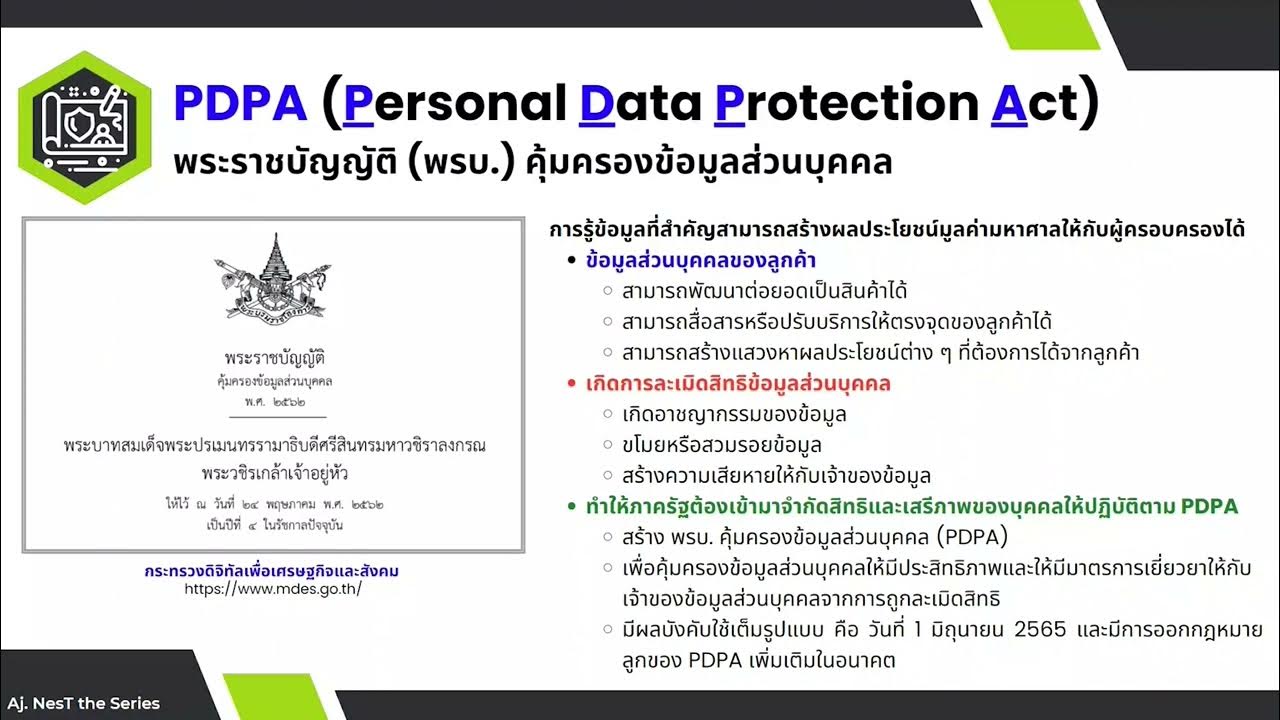【2022年4月】「個人情報保護法」改正・企業が求められる対応とは?ポイント6つを解説!
Summary
TLDRThe video explains the 2022 amendments to Japan’s Personal Data Protection Law, focusing on key changes such as enhanced individual rights, business obligations, and data utilization rules. It covers the digitalization of data access requests, new business responsibilities for reporting breaches, and stronger penalties for non-compliance. Additionally, it introduces new categories for processed data to encourage privacy-respecting innovation. Businesses are urged to prepare for these legal changes by updating their internal processes, ensuring better data management, and enhancing security measures to comply with the new regulations.
Takeaways
- 😀 The 2022 amendments to Japan's Personal Information Protection Law aim to enhance individual privacy rights and adapt to evolving technologies and global trends.
- 😀 One of the key changes is the strengthening of individuals' rights, including easier access to personal data, the ability to request the suspension or deletion of data, and restrictions on third-party data sharing.
- 😀 The definition of 'retained personal data' has been broadened to include data that is retained for less than six months but could still cause irreversible harm if misused.
- 😀 Individuals can now request digital access to their personal data, which was previously only available through paper documents or other physical means.
- 😀 The amendments allow individuals to exercise their rights even when data is used in ways they did not consent to, with relaxed requirements for such requests.
- 😀 Businesses are now required to report data breaches to the Personal Information Protection Commission, a measure inspired by international standards, with some exceptions for data handlers under contract.
- 😀 The revised law prohibits the improper use of personal information, explicitly defining such misuse to prevent exploitation or unauthorized sharing of data.
- 😀 A new 'independent organization' system has been introduced, which allows certain industry groups to be recognized as entities that can oversee and support the protection of personal information.
- 😀 To promote the use of data, the law introduces the concept of 'aggregated data,' allowing for the use of processed information that cannot identify individuals without strict regulatory guidelines.
- 😀 The amendments also include harsher penalties for violations, such as increased fines and more stringent reporting requirements, particularly for foreign companies handling Japanese residents' data.
Q & A
What was the main focus of the 2022 amendments to the Personal Information Protection Law in Japan?
-The 2022 amendments focused on strengthening individual rights regarding personal data, improving data management practices for businesses, and facilitating the safe use of data for innovation and research.
How did the 2022 amendments affect individual rights regarding personal data?
-The amendments enhanced individual rights by allowing easier access to data, the ability to request data deletion, and a broader scope for controlling third-party data sharing.
What changes were made to the disclosure of personal data under the new amendments?
-Individuals can now request personal data disclosure in digital formats, and businesses must accommodate these requests, offering digital alternatives for more efficient data access.
What new responsibilities were added for businesses under the 2022 amendments?
-Businesses are now required to report data breaches to the Personal Information Protection Commission and affected individuals. They also need to comply with new rules regarding data usage and third-party data sharing.
What is the significance of 'aggregate processed information' in the 2022 amendments?
-The amendments introduced the concept of 'aggregate processed information,' where personal data is anonymized and cannot be traced back to individuals, allowing easier and safer use of data for analysis and innovation.
What are the legal obligations for businesses in the event of a personal data breach under the new law?
-Businesses must notify the Personal Information Protection Commission and affected individuals about any data breaches. If the breach occurs through a subcontracted entity, the primary business must report it.
What are the key points regarding third-party data sharing and the new amendments?
-The amendments allow individuals to request the cessation of third-party data sharing and require businesses to keep records of data shared with third parties, making it easier for individuals to track and control their data.
How do the new amendments address the concerns around unauthorized use of personal data?
-The amendments include a provision explicitly prohibiting the improper use of personal data, ensuring that businesses cannot exploit data for unauthorized purposes.
What new rules were introduced for foreign businesses handling Japanese residents' personal data?
-Foreign businesses that handle personal data of Japanese residents must now comply with the same reporting and inspection requirements as domestic businesses, ensuring greater protection for data across borders.
What impact do the amendments have on the penalties for non-compliance with the Personal Information Protection Law?
-Penalties for non-compliance have been increased, with higher fines and stricter enforcement measures to ensure businesses take the necessary precautions when handling personal data.
Outlines

This section is available to paid users only. Please upgrade to access this part.
Upgrade NowMindmap

This section is available to paid users only. Please upgrade to access this part.
Upgrade NowKeywords

This section is available to paid users only. Please upgrade to access this part.
Upgrade NowHighlights

This section is available to paid users only. Please upgrade to access this part.
Upgrade NowTranscripts

This section is available to paid users only. Please upgrade to access this part.
Upgrade NowBrowse More Related Video

Perlindungan Data Pribadi: Undang-Undang Nomor 27 Tahun 2022

Pengantar Undang-Undang Perlindungan Data Pribadi

Elearning Undang-Undang Perlindungan Data Pribadi Part 1

คอร์สเรียน PDPA พรบ.คุ้มครองข้อมูลส่วนบุคคล EP.1 แนะนำที่มาที่ไปของ PDPA

TUDO O QUE REALMENTE PRECISA SABER SOBRE A #LGPD

Treinamento - Dado pessoal
5.0 / 5 (0 votes)